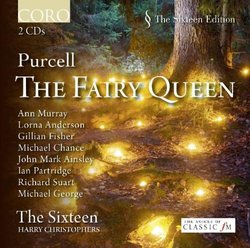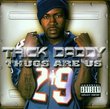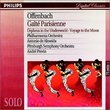| All Artists: Thomas Purcell, The Sixteen, Harry Christophers Title: Purcell: The Fairy Queen (complete) Members Wishing: 0 Total Copies: 0 Label: Coro Release Date: 9/1/2002 Genre: Classical Style: Opera & Classical Vocal Number of Discs: 2 SwapaCD Credits: 2 UPC: 828021600524 |
Search - Thomas Purcell, The Sixteen, Harry Christophers :: Purcell: The Fairy Queen (complete)
 | Thomas Purcell, The Sixteen, Harry Christophers Purcell: The Fairy Queen (complete) Genre: Classical The Symphony of Harmony and Invention, The Sixteen's acclaimed baroque orchestra, makes its first appearance on a CORO disc. The Fairy Queen, one of Purcell's grandest creations, is a fantastic blend of magic, mystery, pas... more » |
Larger Image |
CD DetailsSynopsis
Album Description The Symphony of Harmony and Invention, The Sixteen's acclaimed baroque orchestra, makes its first appearance on a CORO disc. The Fairy Queen, one of Purcell's grandest creations, is a fantastic blend of magic, mystery, passion and tomfoolery - both profoundly moving and entertaining in turn. The Sixteen's superb recording features soloists Ann Murray, Lorna Anderson, Gillian Fisher, Michael Chance and Richard Suart. Based on Shakespeare's A Midsummer Night's Dream, Henry Purcell's The Fairy Queen was composed in 1691/2 and remains without doubt one of his greatest works adding his magic, wit and sensuality to that of the play. One of the greatest of England's composers, Purcell flourished in the years that followed the Restoration of Charles II to the throne, his unique talents celebrated and admired in the atmosphere of artistic creativity and courtly opulence of the time. "A performance like this shows dimensions of Purcell's genius that are all too rarely heard on disc." - Gramophone Similar CDs
|
CD ReviewsA clean and enjoyable work Leonardo A. | Italy | 07/12/2005 (5 out of 5 stars) "I was looking for a record of this opera to study my choral scores, and I had the bad idea to buy the Britten's recording (Decca, 1970). After some minute playing it, I had to give up. What I heard was not music, at least it was not the Purcell music. In the evening I got this edition from a friend of mine. Astonishing! Soloists sing every single word, clearly, tuned and with a fantastic expression. The orchestra is dancing, and the Sixteen chorus (most of them coming from the Tallis group) is perfectly "embedded" and balanced. This is the 4th day I am playing non-stop these 2 CDs, and I cannot get tired of this fluently interpreted Purcell masterpiece." A voice teacher and early music fan George Peabody | Planet Earth | 07/22/2009 (5 out of 5 stars) "A PSEUDO-SHAKESPEAREAN JOYFUL ROMP!
The semi-opera 'The Fairy Queen', one of Purcell's grandest creations, is a blend of magic, mystery, passion and just plain nonsense-both profoundly moving and entertaining in turn. The Sixteen's featured soloists, and excellent they are, are:Anne Murray, Gillian Fisher, Michael Chance, Richard Suart and Michael George. Based VERY loosely on Shakespeare's 'Midsummer Night's Dream', Henry Purcell's (1659-1695) Fairy Queen was composed in 1691/92 and remains without a doubt as one of his greatest works, adding his magic, wit and sensuality to that of the play. This semi-opera contains some of the most seductive melodies to the Baroque Period. Purcell's tunes bring an instant smile of delight; it's love at first sound. Purcell eschewed Shakespeare's words in favor of an anonymous libretto loosely based on the situations of Shakespeare's. It would be difficult to deduce plot or characterizations from the libretto alone and although the music is a continuous joy, it is an imaginative feat to think of this work as a convincing dramatic narrative today. The First Act consists of fairies pinching and tormenting a drunken poet, while the Second Act meditates on the misunderstandings of the lost pair of lovers in Shakespeare's play and rhapsodises on night, sleep and mystery. The Third Act is a bucolic romp in the which the drunken poet (bass-Michael George) chases after Mopsa(countertenor-Michael Chance) begging for a kiss from him/her; you name it. The Fourth Act is a panorama of the seasons and Act Five is an inexplicable Chinese Pantomime; albeit which includes one of the best known songs:"Hark!the Echoing Air". However, most of these songs have been recorded by many singers on solo albums, especially by countertenors. Christphers conducts with stylish lightness and the instrumental group 'Symphony of Harmony and Invention' (on original instruments), is spirited and lively. The soloists are skilled in this genre, and are truly excellent." |



